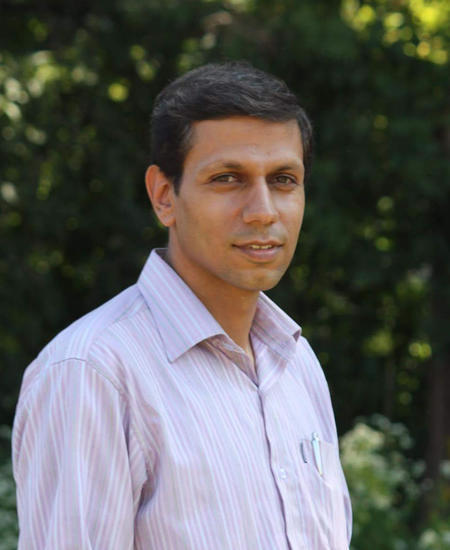Sayed Ahmad Salehi, assistant professor in the Department of Electrical and Computer Engineering, has received a $400,000 award from the National Science Foundation for a new three-year project. Its title is, "FET: SMALL: New Abstraction and Design Automation for Complex Computations with DNA Using Fractional Coding.”
Salehi joined the Department of Electrical and Computer Engineering faculty in 2018. The abstract for the project is below.
Abstract
The use of DNA-based technologies in complex biomolecular circuits is a quickly developing field of synthetic biology that has the potential to disrupt how one designs smart drugs or delivers targeted treatments. Given their biological nature and in-vivo compatibility, other applications for synthesized DNA-based computational circuits that cannot be foreseen now will surely follow. Recent advances in biotechnology have shown the potential for implementing complex DNA-based circuits. However, as the complexity of these circuits increases, they become slower and more difficult to be designed efficiently. As shown in silicon-based technology, new design approaches and automation tools are essential for progress in the field. This project aims to develop a systematic design framework and new approaches for fast and complex molecular computing circuits using fractional coding and to investigate the use of this framework for the efficient and scalable implementation of artificial neural networks (ANNs). Along with the development of the design automation framework, a companion software, called FUNDNA, that maps mathematical FUNctions to DNA reactions will be produced. This freely available, open-source software with its tutorials and documentation will transform bio-design automation research by enabling efficient design of molecular circuits for complex computations with mathematical representation without requiring biological/chemical skills. The tool will make the creation of novel complex DNA computing circuits faster, cheaper, and more accessible. This project includes two major educational initiatives with the goal of broadening participation in STEM. First, students who are underrepresented in engineering fields will be recruited through the Kentucky-West Virginia LSAMP program, the University of Kentucky (UK) Student Chapter of the National Society of Black Engineers, and UK Student Support Services to be trained to work on the research project. A new course, Molecular Programming and DNA Computing Circuits, will be developed to integrate the knowledge and findings of this research and to help train students in the area of DNA computing. Second, an iGEM (International Genetically Engineered Machine) chapter, the first iGEM team in the state of Kentucky, will be established to share resources and compete in international synthetic biology competitions.
This project will enable systematic design of efficient molecular circuits for fast computation of complex mathematical functions. The design of molecular computing circuits will be systematic because the project will develop a new level of design abstraction that accepts mathematical representation of desired computations. It will create an end-to-end compiler that transfers the mathematical representation to chemical reaction network, and then generates candidate DNA reactions and sequences. The developed circuits will be fast because they work based on fractional coding. While for traditional molecular encoding each input/output is represented by a molecular concentration, for fractional coding inputs/outputs are ratios of pairs of molecular concentrations. Molecular circuits based on traditional encoding need to wait for the final (at equilibrium) concentrations of molecules, whereas for circuits based on fractional coding, the ratios reach their final values much faster than molecular concentrations. This project will expand the computational power of molecular computing circuits to complex computations through two approaches: 1) it will map all electronic stochastic computing logic circuits to molecular circuits, 2) it will implement finite state Markov chains by molecular reactions. Finally, the project will develop new approaches for performing ANNs with molecular reactions. The goal is to demonstrate how fractional coding can improve molecular computation, and DNA computing in particular, through three objectives. 1) Development of a design automation framework and a companion software, called FUNDNA, that maps mathematical FUNctions to DNA reactions. 2) Investigation of complex computations such as neural networks based on fractional coding. 3) Experimental DNA implementation of basic molecular computing circuits using fractional coding. This project will have a significant impact on the field of bio-design automation because it will introduce and attempt to realize the idea of automated design of molecular circuits, starting from high level mathematical or algorithmic representation. While there is prior work in molecular computation of different sorts of mathematical functions, no systematic method has been proposed for computing complex general mathematical functions within a molecular circuit.
